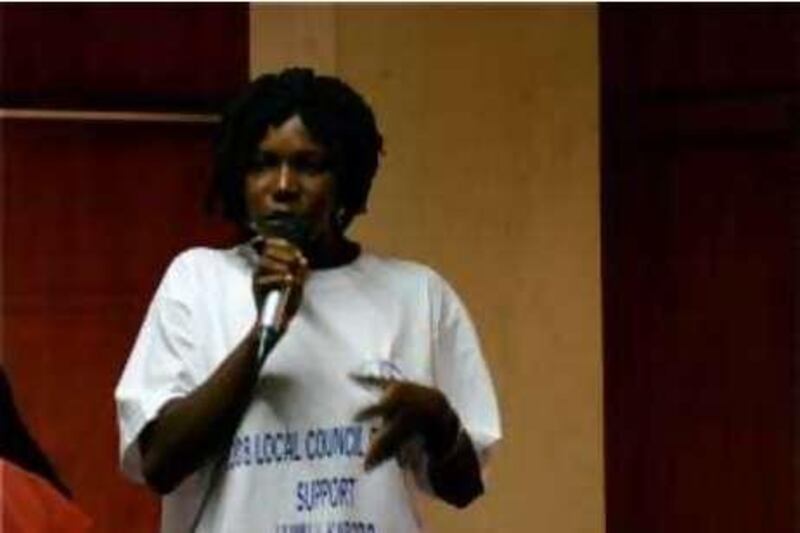FREETOWN // When Humu Kargbo decided to run as an independent candidate in tomorrow's nationwide local elections, she quickly saw the ugly side of politics in Sierra Leone. "The day I announced my independent candidacy, I was literally stoned," she said, adding that one of the stones left her with a deeply bruised arm. Since then, she has been threatened physically as well as with witchcraft, forcing her to stay away from her home village of Hastings for eight days, she said.
Ms Kargbo's experience is not unique. Some candidates and observers claim it is part of a broader pattern of intimidation by the ruling All People's Congress (APC) party to retain power. Women have been particularly targeted, said Sheku Kamara, of the National Democratic Institute (NDI), an organisation affiliated with the Democratic Party in the United States that has been training female candidates.
"In every single case, the women say it's the APC that's harassing them," he said, adding that such tactics were common during the country's turbulent past. Mohammed Bangura, the APC's national organising secretary, denied the allegations. "It is simply a matter of these women being jittery because they don't have support," he said. Ms Kargbo and other independent candidates are former APC members who decided to run on their own because they were not chosen to represent the party, he said.
"When you leave the APC to campaign as an independent you will feel ostracised, and when you feel ostracised you will begin to feel afraid of the group," Mr Bangura said. The National Election Commission announced this week that 71 candidates - including seven women - have withdrawn from the election, which will see local councillors and mayors elected in communities throughout the country. That leaves 38 out of 394 seats uncontested, all of which will go to the APC.
Mr Bangura said most of the former APC members who decided to run as independents and then withdrew did so because they realised they could not win against the party. Miatta French, of the election commission, said she had heard complaints about candidates being intimidated, but could not confirm if that was their reason for withdrawing. "It worries us," she said. "But none of them have given that reason [intimidation] on paper."
On June 11, four candidates, including Ms Kargbo, sent a letter of complaint to the country's Political Parties Registration Commission accusing APC members of "constant intimidation, harassment and threats of physical violence against our persons and supporters". In addition, some candidates have been offered bribes to drop out of the race, said Mr Kamara, of the NDI. Enid Bangura, an independent candidate, said her APC member of parliament had tried to bribe her into withdrawing. Ms Bangura, a former member of the APC, also signed the letter of complaint, although she said she had not personally faced threats or harassment.
The APC ousted the Sierra Leone People's Party (SLPP) in last year's national elections, which brought Ernest Bai Koroma, the president, to power in a decider vote. Those elections were deemed free and fair by international observers, but they were not without controversy - the elections commission invalidated votes in certain areas where it suspected fraud. "The SLPP is to this day contesting the outcome," Mr Kamara said.
He said tomorrow's elections were a chance for the APC to prove its popularity with a decisive win over the SLPP, which still dominates local councils. "They already have a head start," he said, referring to the 38 now-uncontested seats. Mr Kamara said political bullying was part of the country's history. The APC ran Sierra Leone as a one-party state from 1968 to 1992, a period during which the country was engulfed in a decade-long civil war. Its reign was marked by corruption and political repression.
"One of the things that led to war in the first place was the lack of political participation," Mr Kamara said. The mostly peaceful campaign has been marred by incidents of violence, notably in the diamond-rich Kono region, in the interior of the country. National Election Watch, a non-governmental organisation, said in a statement last week that its observers had documented harassment of candidates, including stones thrown at houses, physical assault and verbal abuse.
Alphonsius Gbani, of the Organisation for Development and Human Rights, predicted more violence on election day. "It will not be large scale, but there will be pockets," he said, adding that such tactics undermine Sierra Leone's democratic development. Gebremedhin Haggos, the director of the peace and governance section of the United Nations' peacekeeping mission, also warned of election-day violence, but downplayed its significance. He said any serious political instability would have already manifested itself during the campaign period.
"By now it should have exploded. There have been isolated cases in Kono, but not generally," he said. But Ms Kargbo said she has been harassed and threatened constantly throughout her campaign. She said the APC must consider her a serious contender if party members were going to such lengths to try to force her to bow out. It only strengthened her resolve, she said, adding she hoped to set an example for other women who are interested in politics.
"A whole generation is lost [to the war], social structures have collapsed," Ms Kargbo said. "With women in politics we believe we will be able to fix these structures that have fallen apart." @Email:jferrie@thenational.ae





